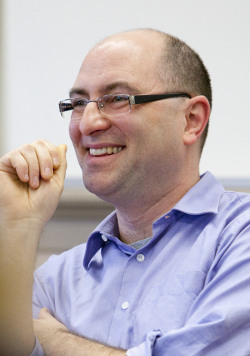History professor Seth Cotlar has been selected to participate in a seminar sponsored by the Council of Independent Colleges on Slave Narratives this June.
Cotlar is one of 27 faculty members chosen from nearly 100 nominees to gather at Yale University for the collaborative discussion.
According to the Council’s website, “The seminar will use the slave narratives, as well as some other assigned secondary reading, to comprehend the lived experience of slaves themselves in the transition from bondage to freedom.”
Cotlar says he is eager to learn from fellow historians and professors.
“It’s a great opportunity to pick up ideas from other professors and historians, whether it be texts they use, questions they ask, assignments they teach or projects they’ve done with students,” Cotlar says.
“People often approach teaching the same subject in really different ways, so I think that will be valuable for me to learn from other folks who are there.”
Yale history professor David Blight, one of the top scholars on American slavery, will lead the seminar.
“Blight is a phenomenal historian and has written a number of really important books on the topic,” Cotlar says. “It’s like a chance to go back to school as a student with someone who is probably one of the world’s leading thinkers and experts on the topic.”
Working with notable scholars will help Cotlar generate new ideas and resources for his own classes, he says.
“Just this past year, I taught for the first time a history course on the experience of enslavement in the 19th century U.S.,” Cotlar says. “It was oriented around primary sources and reading slave narratives and interviews with formerly enslaved people. I think this seminar will enable me to add new things to that class and refine it.”
Some of the seminar attendees also work with students to contribute to digital history archives, and Cotlar says he hopes to engage Willamette students in that process.
“The students in the experience of enslavement class write extended research papers, and there are many ongoing research projects that students here could get involved with,” Cotlar says. “A lot of work has been done to build the archive of African American history over the past 30 or 40 years, but there’s still a lot to do.”
Cotlar will be on sabbatical next year, during which time he will be working on his second monograph. Cotlar’s first book, “Tom Paine's America: The Rise and Fall of Trans-Atlantic Radicalism in the Early Republic,” won the Best First Book Prize from the Society for Historians of the Early American Republic. His second book will explore the cultural history of nostalgia in modernizing America and the disruptive impact the internal slave trade had on the lives of enslaved people in the 19th century.
“Part of that book draws on slave narratives as its source base,” Cotlar says. “So this seminar will give me a chance to really think carefully about how I want to use those sources.”
• Article by Emma Jonas ’15, creative writing major

